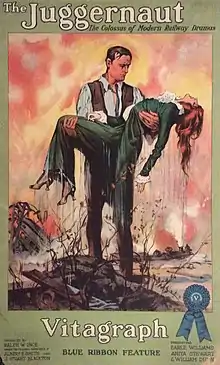The Juggernaut
The Juggernaut is a silent train disaster drama produced by the Vitagraph Company of America and released on April 19, 1915. It was directed by Ralph W. Ince and stars Earle Williams and Anita Stewart.[1]
| The Juggernaut | |
|---|---|
 | |
| Directed by | Ralph W. Ince |
| Produced by | Albert E. Smith J. Stuart Blackton |
| Written by | Donald I. Buchanan Ralph W. Ince |
| Starring | Earle Williams Anita Stewart |
| Cinematography | William S. Adams William T. Stuart Walter Arthur |
Production company | |
Release date |
|
Running time | 5 reels |
| Country | United States |
| Language | Silent English intertitles |
Plot
John Ballard's (Earle Williams) parents are killed in a railroad accident. In college, he meets and becomes friends with Philip Hardin (William R. Dunn), the son of the railroad owner. Philip plays poker with a gang of sharpers and a fight breaks out when he discovers he is being cheated. Red Hogan (Jack Brawn), the chief of the gang, would have killed Philip, but John rushes in and breaks a chair over his head. Red Hogan is apparently killed. No one knows who did it and Philip swears he will never reveal John's secret.
After graduation, John meets Viola Ruskin (Anita Stewart) and the two fall in love. Philip has run into debt and his father (Frank Currier) threatens to cut him off if he does not marry and settle down. With the Hardin fortune in mind, Viola's mother (Julia Swayne Gordon) forces her to marry Philip. She dies a year later after giving birth to a daughter, Louise.
Twenty years later, John is the District Attorney and he brings a suit against the railroad. Although Philip owns it, he has little involvement in its operation. Chester Jordon (Paul Scardon), one of the company's largest shareholders, has real control of the line and is maximizing profits by cutting maintenance and safety measures. Philip would blackmail John into silence, but Louise (Anita Stewart) discovers that John did not actually kill Red Hogan after all.
Philip is indicted and goes to trial. John's case against the railroad is strong. At recess, Philip calls Louise for documents kept in his home safe. Her car breaks down on the way and she telegraphs that she will come on the train. Meanwhile, a railroad inspector discovers that the bridge her train will cross is in imminent danger of collapse. Philip races to catch the train but is too late. The bridge breaks apart and the train crashes into the water, its boiler exploding.
The Juggernaut had three endings. At the premiere, John rushes to the scene and pulls Louise from the wreckage, but she is dead. Alternately, he finds her in a coma and she is taken to the hospital. After several days, she awakens and John is there to profess his love to her. When the film was released in Britain, the happy ending was retained but greatly shortened, with Louise waking up just after being dragged ashore.
Cast
- Earle Williams - John Ballard
- Anita Stewart - Viola Ruskin / Louise Hardin
- William R. Dunn - Philip Hardin
- Julia Swayne Gordon - Mrs. Ruskin
- Eulalie Jensen - Mrs. Ballard
- Frank Currier - James Hardin
- Paul Scardon - Chester Jordon
- Jack Brawn - Red Hogan
Survival status
The Juggernaut was originally five reels long, but only two are known to survive today. These exist in private collections.[2] The film has been reconstructed twice using production stills and title cards to replace the missing material. The 2012 reconstruction was 30 minutes long and the 2017 reconstruction 62 minutes.[3] Both were produced by Harpodeon. The original film would have been between 60 and 80 minutes long, depending on projection speed.
Associated media
Dorothy Donnell published a novelization of The Juggernaut in the April 1915 issue of Motion Picture Magazine[4]
References
- Motion Picture News. 11. Exhibitors' Times, inc. April 24, 1915.
- "The Juggernaut / Ralph W Ince [motion picture]". Library of Congress. Retrieved July 22, 2019.
- "The Juggernaut". Harpodeon. Archived from the original on April 5, 2015. Retrieved July 22, 2019.
- Donnell, Dorothy (April 1915). "The Juggernaut". Motion Picture Magazine. The Motion Picture Publishing Co.